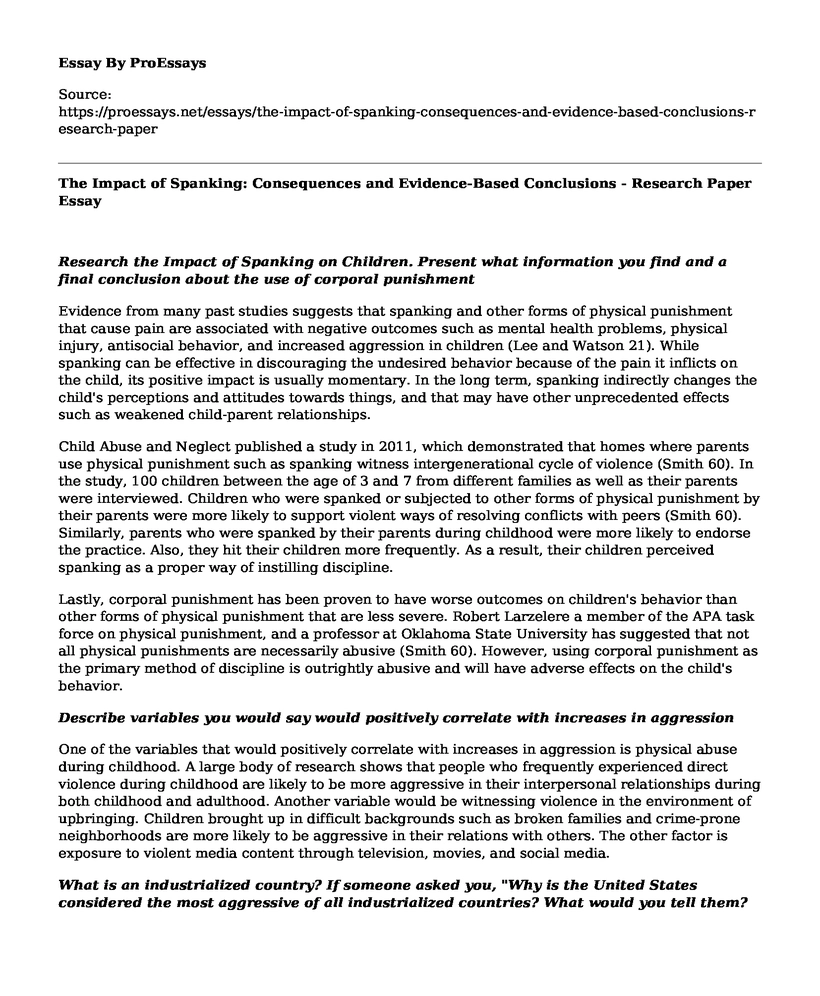Research the Impact of Spanking on Children. Present what information you find and a final conclusion about the use of corporal punishment
Evidence from many past studies suggests that spanking and other forms of physical punishment that cause pain are associated with negative outcomes such as mental health problems, physical injury, antisocial behavior, and increased aggression in children (Lee and Watson 21). While spanking can be effective in discouraging the undesired behavior because of the pain it inflicts on the child, its positive impact is usually momentary. In the long term, spanking indirectly changes the child's perceptions and attitudes towards things, and that may have other unprecedented effects such as weakened child-parent relationships.
Child Abuse and Neglect published a study in 2011, which demonstrated that homes where parents use physical punishment such as spanking witness intergenerational cycle of violence (Smith 60). In the study, 100 children between the age of 3 and 7 from different families as well as their parents were interviewed. Children who were spanked or subjected to other forms of physical punishment by their parents were more likely to support violent ways of resolving conflicts with peers (Smith 60). Similarly, parents who were spanked by their parents during childhood were more likely to endorse the practice. Also, they hit their children more frequently. As a result, their children perceived spanking as a proper way of instilling discipline.
Lastly, corporal punishment has been proven to have worse outcomes on children's behavior than other forms of physical punishment that are less severe. Robert Larzelere a member of the APA task force on physical punishment, and a professor at Oklahoma State University has suggested that not all physical punishments are necessarily abusive (Smith 60). However, using corporal punishment as the primary method of discipline is outrightly abusive and will have adverse effects on the child's behavior.
Describe variables you would say would positively correlate with increases in aggression
One of the variables that would positively correlate with increases in aggression is physical abuse during childhood. A large body of research shows that people who frequently experienced direct violence during childhood are likely to be more aggressive in their interpersonal relationships during both childhood and adulthood. Another variable would be witnessing violence in the environment of upbringing. Children brought up in difficult backgrounds such as broken families and crime-prone neighborhoods are more likely to be aggressive in their relations with others. The other factor is exposure to violent media content through television, movies, and social media.
What is an industrialized country? If someone asked you, "Why is the United States considered the most aggressive of all industrialized countries? What would you tell them?
An industrialized country is a sovereign state with an advanced economy characterized by high per capita income, gross national product, and gross domestic product, and has well developed technology as well as physical infrastructure. Industrialized countries also tend to have better living standards, which lead to higher life expectancy than the relatively less developed countries.
The United States is considered the most aggressive of all industrialized because it has been registering more cases of homicide and deaths from both criminal attacks and police violence than any other developed country in the world for many decades now. The high rate of violence in the United States has partly been blamed on the state of anarchy that characterized many parts of the country, especially for the first two centuries after independence. Before the 20th century, the people had to keep guns to protect themselves because they could not count on the government for security (Lee and Watson 25). Besides, absolute democracy in America has made it possible for many people to impose their desires. Lastly, most homicide deaths in the US involve shootings, and that means the country's gun control laws have not been effective in controlling aggression and violent acts.
Works Cited
Lee, Yoona, and Malcolm W. Watson. "Corporal Punishment and Child Aggression: Ethnic-Level Family Cohesion as a Moderator." Journal of Interpersonal Violence, 2017, p. 088626051770422.
Smith, Brendan L. "The case against spanking: Physical discipline is slowly declining as some studies reveal lasting harms for children." American Psychological Association, vol. 43, no. 4, Apr. 2012, p. 60, www.apa.org/monitor/2012/04/spanking. Accessed 11 Apr. 2020.
Cite this page
The Impact of Spanking: Consequences and Evidence-Based Conclusions - Research Paper. (2023, May 18). Retrieved from https://proessays.net/essays/the-impact-of-spanking-consequences-and-evidence-based-conclusions-research-paper
If you are the original author of this essay and no longer wish to have it published on the ProEssays website, please click below to request its removal:
- Essay Sample on Women and Employment
- Creative Writings on Positive and Negative Punishment and Ideal Slot Machine for Gambling
- Drug Abuse in Athletes: The Need for Weed Essay
- How Does the Traditional or Cultural Belief Influence the Prevalence of Mental Health in Individuals
- Correlation Between Political Science and Terrorism - Essay Sample
- Essay Sample on Social Media Usage: Four Billion Users Globally and 70% in US
- My Brother's Drug Addiction - Essay Sample







